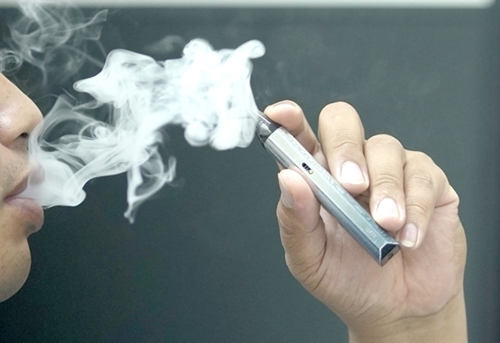At a recent press conference on tobacco harm prevention, associate professor Luong Ngoc Khue, Director of the Department of Medical Service Administration cum Director of the Vietnam Steering Committee on Smoking and Health said that reports from nearly 700 medical examination and treatment facilities nationwide showed that last year alone saw more than 1,200 people hospitalized due to using e-cigarettes.
    |
 |
|
A man uses an e-cigarette. |
580 of those cases were 65 years old and older and the youngest group of patients were under 16 years old and accounted for 27 cases.
According to the World Health Organisation (WHO), more and more evidence shows that e-cigarettes are as harmful to health as regular cigarettes.
E-cigarettes contain nicotine, which is an addictive substance, so minors may experience difficulty and discomfort when using them.
Nicotine affects the respiratory and cardiovascular systems.
It increases the risk of cancer, angina, heart failure, stroke and immunodeficiency. It reduces resistance and causes other health problems.
It is especially harmful to brain development in children, impairing memory and affecting intellectual development
|Citing data from the WHO and the Campaign for Tobacco-Free Kids, the US, Khuê said now at least 39 countries and territories have imposed a complete ban on e-cigarettes.
Five of them are in the ASEAN region: Thailand, Singapore, Laos, Brunei and Cambodia.
Discussing the issue at the explanation session about state management on e-cigarettes and heated tobacco, which was held May 4 in Hanoi, representatives requested to clarify the responsibilities of various agencies.
During the session, chaired by the National Assembly (NA)’s Social Affairs Committee, in coordination with the NA’s Committee for Culture and Education, experts also wanted to make clear the MoH’s and the MoIT’s opinions on banning, or not banning, the new type of cigarettes.
Deputy Chairman of the Social Affairs Committee Dang Thuan Phong said that the harmful effects of e-cigarettes and heated tobacco on health, economy, environment, social ethics, physiology, social order and safety had been identified and warned about for a long time, but currently there was no clear legal regulation.
Pointing out the lack of consensus among ministries, NA deputy Tran Thi Van, from the northern province of Bac Ninh, wondered while the MoH proposed banning e-cigarettes and heated cigarettes, the MoIT wanted to put them under management like regular cigarettes.
She asked the MoIT to clarify reasons for this proposal, especially about its impact and what benefits the state and people would get from it.
Deputy head of the NA's Culture and Education Committee Nguyen Thi Mai Hoa wanted to know whether the MoIT’s studies had taken into account harm to human health.
She also worried about the balance between the economic benefits of the e-cigarette business and health care costs.
“Girls also use e-cigarettes. When the Ministry of Industry and Trade proposed the pilot management, did it study the human resources’ cost?" said Hoa.
Deputy Minister of Industry and Trade Phan Thi Thang expressed her agreement with the view that protecting the people’s health and the community should be placed first.
The MoIT focuses on preventing illegally trading, transporting and storing tobacco products, cigars, and e-cigarettes. But the current penalties are not a deterrent and cannot discourage the smugglers.
The Ministry has proposed a pilot management mechanism with the aim of improving effective controls on the trade of e-cigarettes.
Emphasizing the MoH's determination on banning e-cigarettes and heated tobacco, Minister of Health Dao Hong Lan said that the MoH has implemented many advisory works for state management.
Specifically, the MoH deployed international cooperation to grasp the current situation of the world, seek opinions from ministries and submit it to the government.
In addition, the MoH also organized a review of ten years of implementing the Law on Prevention and Control of Harmful Effects of Tobacco to respond to the changing situation, but warned that it cannot be revised in a hurry and needs thorough scientific evidence.
Medical expert, NA deputy Nguyen Anh Tri, from Hanoi, said that e-cigarettes were comprehensively and clearly harmful, and even caused addiction.
Expressing the same opinion as the MoH, Major General Tran Nguyen Quan, Deputy Director of the Department of Legal Affairs, Administrative and Judicial Reform under the Ministry of Public Security, stated that lots of young people used e-cigarettes, especially in bars, cafes, and entertainment areas.
They use the products even more than regular cigarettes.
He pointed out that drug criminals often mix drugs into e-cigarettes to cause addiction.
“They smoke even when waiting for the traffic red light," said Quan. "The situation becomes serious. Therefore, e-cigarettes should be banned because they are more harmful than economic benefits.”
NA deputy Huynh Thi Phuc, from Ba Ria-Vung Tau province, said that applying digital technology and social networks in law education was being promoted, however, the role of these websites in preventing and combating the harmful effects of e-cigarettes was limited.
So, she believed, more efficient solutions were needed for better education in the future.
Minister Lan said that every year, the MoH coordinated with the Ministry of Education and Training, the Ministry of Information and Communications, the HCM Communist Youth Union Central Committee, Vietnam Women's Union and other agencies to strengthen priority on the issue.
Books which identify the harmful effects of tobacco have been delivered to students as one of the solutions.
Source: VNA